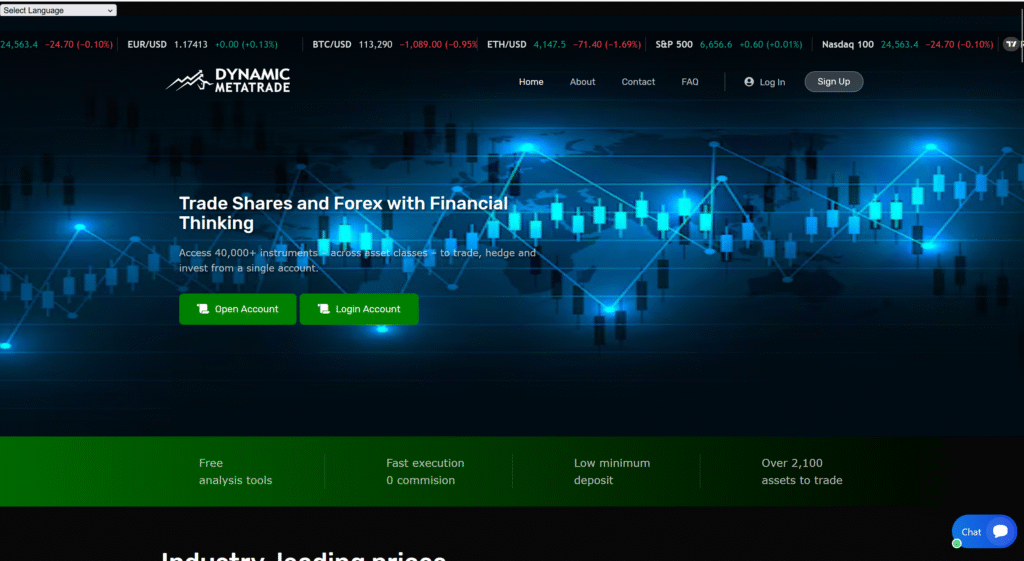1. FCA Issues a Formal Warning: Unauthorized Operation
One of the strongest signals that Dynamic Metatrade / dynamicmetatrade.com is not trustworthy is the official warning issued by the UK’s Financial Conduct Authority (FCA). The FCA states that this firm is not authorised or registered to provide financial services in the UK and may be targeting consumers there.
When a firm operates without authorization, users lose crucial protections such as recourse through the Financial Ombudsman Service and coverage under the Financial Services Compensation Scheme (FSCS). The FCA explicitly warns: “If you deal with this firm, you won’t have access to the Financial Ombudsman Service… You also won’t be protected by the FSCS if things go wrong.”
That means once you deposit funds, there’s no regulator guaranteeing fair behavior or enforcing refund obligations. Operating outside regulatory oversight is a classic trait of high-risk or fraudulent platforms.

2. Listed as Unlicensed by IOSCO / I-SCAN
Dynamic Metatrade is also flagged in the IOSCO / I-SCAN alerts as an “Unregistered / Unlicensed entity offering financial products or services.”
IOSCO’s inclusion amplifies the credibility of other warnings, since their network aggregates alerts globally. A listing there confirms that multiple regulators see this entity as operating outside acceptable norms across more than one jurisdiction.
3. Misleading Contact Details & Hidden Identity
In its warning, the FCA notes that unauthorized firms often provide incorrect or misleading contact details—addresses, phone numbers, or emails—that may be fake or belong to unrelated businesses.
This makes it difficult for victims to trace, confront, or hold operators accountable. Legitimate firms are transparent about their corporate structure, leadership, and audited filings; when those are missing, suspicion is warranted.
4. Promises of Safety Without Regulation
Some promotional materials or sales pitches around platforms like Dynamic Metatrade may try to appeal to safety, advanced features, or “secure trading.” But without regulation, those claims are only marketing. Real financial oversight comes with regulatory audits, capital requirements, and ongoing supervision—none of which apply here.
5. High Risk of Withdrawal Problems
It is common with unauthorized platforms that they block or delay withdrawals once users try to take out funds. Because regulators have no control over them, the firm can insert arbitrary verification demands, “processing fees,” or excuses to obstruct exits. Victims may find their accounts frozen or funds withheld indefinitely.
While I did not find public detailed testimonies specific to Dynamic Metatrade in the sources I reviewed, the pattern is consistent across similar firms and is implicitly warned through the FCA’s cautionary language.
6. Third-Party Reviews Already Flag Concerns
Beyond regulatory warnings, industry reviewers also raise red flags about similarly named platforms (e.g. Dynamic Trade). For example, BrokerChooser states that Dynamic Trade is not regulated by any major authority, making it a risky choice for traders.
Similarly, TradersUnion’s review of “Dynamic Trade” (though not exactly the same domain) notes the absence of regulation, lack of verified corporate data, and categorizes it as high risk.
While not every “Dynamic Trade” review refers to Dynamic Metatrade specifically, the similarities in name and business model suggest overlapping warning signs.
7. Regulatory Protections Are Void
Because Dynamic Metatrade is not authorized by the FCA, clients lose many fundamental protections:
- No guarantee from FSCS in case of platform failure
- No access to financial ombudsman channels
- No transparency obligations or oversight
- No required capital or audit disclosure
The FCA warns consumers to avoid dealing with unauthorised firms and to use the FCA’s Firm Checker to verify legitimacy before investing.
In short: you give up institutional protections when you deal with entities outside regulation. That makes the risk asymmetrically high.
Conclusion
Dynamic Metatrade (via dynamicmetatrade.com) is one of the many platforms currently under regulatory scrutiny. The FCA’s warning that this company is not authorized in the UK should serve as a red light to any potential investor. Regulation isn’t mere formality—it’s the safety net that ensures disputes can be resolved, accounts can be audited, and operators are held to enforceable standards.
When firms operate in a regulatory vacuum, they essentially trade with impunity. Users lose rights they might take for granted—such as complaint escalation through a financial ombudsman, enforced reimbursement in the case of misconduct, and mandatory disclosure of financials and risk practices. The warning from FCA explicitly points out that you won’t be protected if things go wrong.
The IOSCO / I-SCAN listing reinforces the seriousness of this situation. Being flagged at that level means that the entity is on the radar of international regulators for operating without license across multiple regions.
Promotional promises like “secure trading” or “guaranteed returns” ring hollow when there is no regulatory backing—those claims have no enforcement. If withdrawals are blocked or funds locked, there is no authority you can appeal to. The ambiguity in contact information makes it even harder for victims to seek redress.
Third-party reviews of similarly named entities amplify red flags already raised by regulators. While such reviews aren’t always specific to Dynamic Metatrade, the overlap in name and business model suggests consistent patterns of risk. BrokerChooser explicitly warns against trusting platforms that lack strong regulatory oversight.
At the core, dealing with a platform that cannot prove its legitimacy is playing a dangerous game. Fraudulent platforms often lure victims with polished interfaces and aggressive marketing, then trap funds behind opaque withdrawal rules or sudden “verification” demands once deposits are made.
If you have been approached by Dynamic Metatrade, or you’ve already deposited funds, take these steps:
- Pause further deposits immediately.
- Attempt a small withdrawal to test responsiveness.
- Document every interaction: emails, screenshots, balances, timestamps.
- Check if any legitimate regulatory bodies list the firm, beyond their own claims.
- Report to your local financial regulator and file complaints.
- Share your experience publicly, in forums or review sites, to warn others.
In today’s digital financial environment, scammers adapt fast, but so can informed investors. Your diligence, skepticism, and verification before commitment are your most powerful tools. Always verify license status, regulatory legitimacy, and independent reviews before trusting any platform with your funds.
Your awareness is your strongest defense. Avoid instruments and platforms that cannot prove they operate under enforceable rules.


